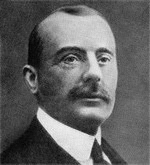Alexandru Marghiloman
| Alexandru Marghiloman | |
|---|---|
 |
|
| Prime Minister of Romania | |
|
In office March 5, 1918 – October 23, 1918 |
|
| Monarch | Ferdinand I |
| Preceded by | Alexandru Averescu |
| Succeeded by | Constantin Coandă |
| Personal details | |
| Born | July 4, 1854 Buzău, Principality of Wallachia |
| Died | May 10, 1925 (aged 70) Buzău, Kingdom of Romania |
| Nationality | Romanian |
| Political party | Conservative Party |
| Spouse(s) | Elisa Știrbei |
| Religion | Romanian Orthodox |
Alexandru Marghiloman (July 4, 1854 – May 10, 1925) was a Romanian conservative statesman who served for a short time in 1918 (March–October) as Prime Minister of Romania, and had a decisive role during World War I.
Born in Buzău, he entered the Saint Sava National College in Bucharest, and then studied Law in Paris. Marghiloman was elected to the Romanian Parliament in 1884, and joined the government in 1888.
A member of the Conservative Party, he supported cooperation with the German Empire and Austria-Hungary in the Triple Alliance, and, at the beginning of World War I, he favoured neutrality. Romania remained neutral until 1916, when she entered on the Allied side and this was the reason he refused a seat in the Ion Brătianu's liberal government.
After the Germans occupied Bucharest, he remained there as the president of the Romanian Red Cross, and acted as a mediator between the German occupation authorities and the Romanian population. He rejected the ideas of the German side of forming a parallel administration to King Ferdinand I's government that was moved to Iaşi.
However, since Bolshevist Russia withdrew from the war and the Germans could occupy the rest of Romania, king Ferdinand requested Marghiloman to become a Prime Minister, hoping that with a pro-German Prime Minister it would be easier to make peace with the Germans, and knowing that Germany would consider the Western Front to be much more important.
...
Wikipedia
